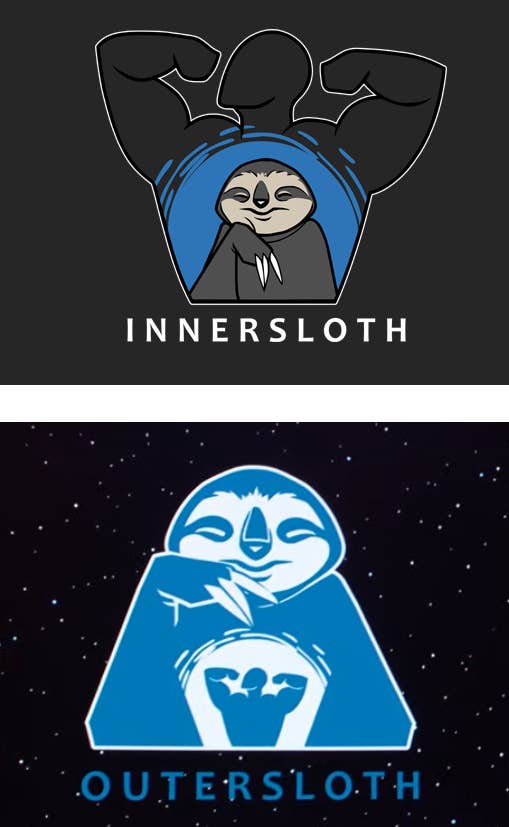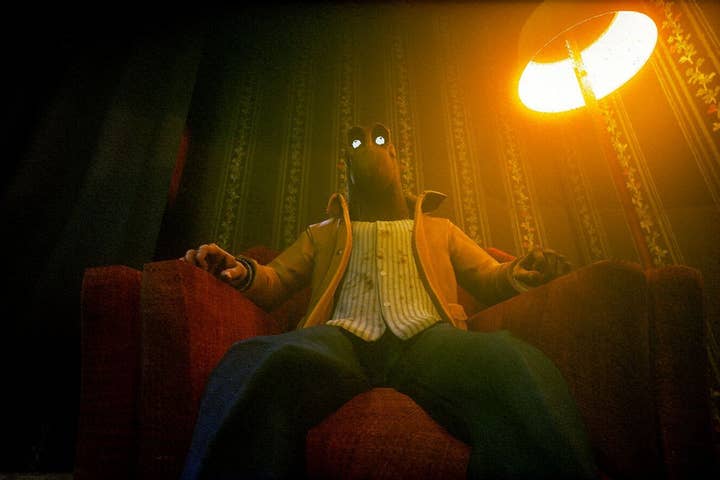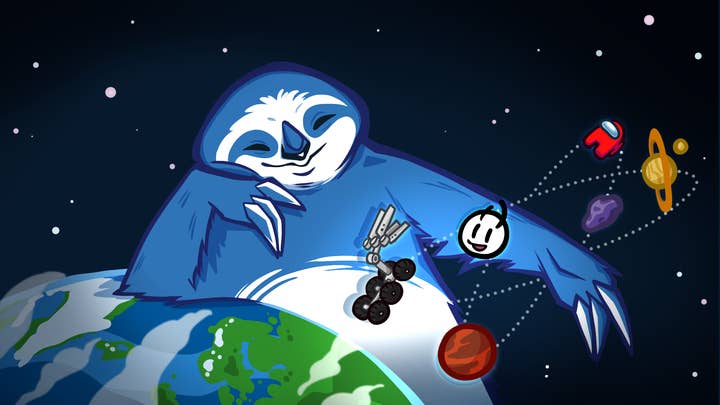How Outersloth is turning Among Us' success into funding for indies
Innersloth's Victoria Tran on empowering indies, and the urgent need for sustainability in the industry
Outersloth has been a "really bad open secret" since 2022.
That's what Innersloth's communications director Victoria Tran tells us as we sit down to chat about the new indie fund from Among Us developer Innersloth. Unveiled this June, the initiative aims at providing funding to small studios, with a number of teams already supported including Outerloop Games, Strange Scaffold, and Visai Games.
But the first signs of Outersloth were seen when the new venture signed its very first title, Mars First Logistics from Australian studio Shape Shop.

"[As part of the announcement] we had the Outersloth logo, which is basically the Innersloth logo inverted, in that the sloth is on the outside and the person's on the inside. And we had some people message us really concerned being like, 'I think there's someone out there trying to steal your name!'," Tran laughs.
"I had to be like, 'We know about it, it's fine, don't worry!' And I couldn't say anything else because we wanted to wait until we really smoothed out the process and nailed down what we wanted to do. And also because I [thought] once we get a few more games, it would actually be a really nice big announcement that we could save for a showcase, which happened at Summer Game Fest."
But the idea for Outersloth precedes the Mars First Logistics deal by a few years, with Tran saying the fund had been in discussion at Innersloth since 2020.
"Forest Willard, our CEO, always wanted to do something like this," she recalls. "But pre-Among Us success days, it was not really a possibility. Once Among Us started popping off in 2020, it became pretty apparent to him that this was a thing that could happen. And it took a lot of setup."
"Ideally Outersloth itself will become self-sufficient"

Figuring out exactly what makes a good deal for an indie was at the core of the idea, as the original team at Innersloth had been approached in the past by publishers with some shady terms – a common occurrence for developers.
"I wouldn't use the word 'predatory' but just not worth the services," Tran sums up. "And just kind of going from there, understanding what we would have wanted to see when we didn't have the success that we did, the kind of deal, the kind of funds, the kind of people that we wanted to work with, in the before times… It just sprung from there."
Among Us has experienced incredible success over the past few years, maintaining great momentum since 2020, and it seems like the title is here to stay; we ask Tran how reliant Outersloth is on Among Us' continued success.
"At the end of the day, our true passion is making games, right?," she answers. "So whether that's making it ourselves, or we can support people making it with Outersloth. We still, as a team, want to be making our own games. We want that to be our main way of doing things. Which is nice because it [takes] a lot of pressure out of Outersloth, but it does mean at the end of the day the success of Innersloth, and our people, comes first.
"So we're not spending money in a way that's like, 'I guess we now have to lay off half of our people because we're spending it on this other thing that we think is fun'. Ideally Outersloth itself will become self-sufficient. So we pumped money into it but hopefully Outersloth, from the investments we've made in other games, at least breaks even and whatever money that comes into it goes back out into funding more games.
"But it's not going to start draining money from Innersloth in a way that becomes uncomfortable for anyone on the team. So, I would say it was dependent in the sense that it could not have existed without Among Us. But now, hopefully, if all goes well, it will not be dependent on Among Us and its success."
She adds mysteriously that the team "has other things planned too," though we won't know more about it for now.

Outersloth has been very clear from the get go about not being a publisher, meaning the support is primarily funding.
"We definitely are much better at supporting more self-sufficient teams," Tran explains. "And I think that's why we've been so careful about saying that we're a game fund rather than a publisher.
"[Publishers] are going to miss out on some really great games because of the kinds of deals that we're so used to in the industry"
"I think a publisher implies [that] you get marketing help, you get QA help, localisation, all the kinds of things that you would expect [and] I'm very careful about setting expectations... I have a background in marketing and I'm more than happy to give advice and help out where I can. But I don't like to promise things that I can't give. We don't want to promise anything that's not going to happen."
She adds: "So it's why we are very specific about: we'll provide funds, and here are all the other optional hopeful things that we can do, but because we can't promise it to you, we're not going to."
Tran highlights there are some "amazing publishers out there" and acknowledges that there is a place and a use for full-service publishing – but that's not the route Innersloth wanted to pursue.
The types of games Outersloth is looking for varies, with Tran highlighting in a laugh that there probably isn't a Venn diagram where Strange Scaffold's Clickolding and Mars First Logistics slot together. She had previously said that it was more about 'vibes' than tangible, specific aspects.
"We really believe in teams, whether it's your first game or your fifth game. Just supporting good people doing good things is the real vibe."
She continues: "It's nice because Forest and I have similar enough tastes when it comes to what we're looking for [but] also just different tastes in genres, different tastes in what we consider fun, and I think that creates a nice balance.
"Having the different tastes, and the different perspectives [is] I think what makes the games industry so rich and fun to work with."

For now, Outersloth is run by the Innersloth team in addition to their other roles, with a contractor helping out as well. How much it'll grow will depend on how these initial deals pan out, but Tran is hoping that it creates a sustainable, self-sufficient model; a breath of fresh air in the current state of the industry, that she's hoping will inspire others.
"The hope is that Outersloth can create terms that work, and that really put the developer first, in a way that is also still sustainable to the fund – you also need to survive as a company. And creates this kind of race to the bottom of publishers trying to almost outbid each other into giving devs the best deal that they can give, because otherwise they're going to miss out on some really great games because of the kinds of deals that we're so used to in the industry. Whether that works is another thing, but hopefully," she laughs.
"The industry itself thrives when you have different funding models for different needs, some people want the full service publishing things, some just need the money, and do their own thing. But there's a lot of different funds out there. There's a lot of different publishers out there. Outersloth is hopefully one throwing its hat in the ring that can make something that works."
Our conversation takes place on the day Bungie announced it was laying off 220 people, an umpteenth wave of redundancies in an industry that Tran calls "bleak" at the moment.
"We really believe in teams, whether it's your first game or your fifth game. Just supporting good people doing good things is the real vibe"
"It's just difficult all around whether it's for game funding or it's just keeping studios open. And hopefully, in times like this, people can find support with each other, whether it's indies helping indies [or]… It would be great if it's corporations, bigger ones, helping indies as well, or helping each other. And just trying to change things because obviously it feels like, at the rate that we're going, it's not very sustainable. We're losing a lot of talent, we're losing a lot of ideas.
"What's that quote? It's really dark and I don't want to make it [sound] like it's the same as dying. 'If it's one death, it's a tragedy. If it's a thousand, it's a statistic.' [We don't want to be] reducing people to, well, that's just another 2% of the industry' or something."
We ask Tran whether she believes big, successful companies have a responsibility to share the wealth and help boost new talent.
"I think so. I mean, it's so hard because it's so wrapped up. I'm not the CEO of PlayStation, you know, I don't have to wake up and think of the shareholders," she smiles.
"I don't know if they need to be doing the exact thing we're doing because I don't know their situation. I would love that. I think it's the idea that a lot of people have talked about: when you chase max profitability at the expense of people then you just lose out on… I don't know, it feels like the point of doing anything, really. That infinite number that always has to go up, whatever it is.
"Whether or not I think it's their duty? I would say as a person it'd be nice to help out your fellow people, whether it's in the way of a fund, [or] some other initiative that only they could possibly dream up and do. But I think it's just thinking of people first, honestly."

